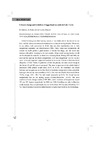Identificador persistente para citar o vincular este elemento:
https://accedacris.ulpgc.es/jspui/handle/10553/17522
| Campo DC | Valor | idioma |
|---|---|---|
| dc.contributor.author | Abella Pérez, Elena | es |
| dc.contributor.author | Marco, Adolfo | es |
| dc.contributor.author | López-Jurado, Luis Felipe | es |
| dc.date.accessioned | 2016-06-21T02:31:49Z | - |
| dc.date.accessioned | 2018-06-15T09:25:25Z | - |
| dc.date.available | 2016-06-21T02:31:49Z | - |
| dc.date.available | 2018-06-15T09:25:25Z | - |
| dc.date.issued | 2007 | es |
| dc.identifier.uri | https://accedacris.ulpgc.es/handle/10553/17522 | - |
| dc.description.abstract | Global warming can affect nesting success of sea turtles due to the rise of the sea level and the subsequent increased inundation or erosion of nesting beaches. Moreover, it can reduce male production to levels that can alter reproduction due to their temperature dependant sex determination (TSD). Now, mean nest temperatures all around the world predict a predominance of female hatchlings, and this trend may increase with global warming in the next decades. | es |
| dc.format | application/pdf | es |
| dc.language | eng | es |
| dc.source | 14th European Congress of Herpetology and SEH Ordinary General Meeting, Porto (Portugal), 19-23 September 2007. Pag. 42 | es |
| dc.subject | 24 Ciencias de la vida | es |
| dc.subject | 2401 Biología animal (zoología) | es |
| dc.subject | 240116 Herpetología | es |
| dc.title | Climate change and the evolution of loggerhead sex-ratio in Cabo Verde | es |
| dc.type | info:eu-repo/semantics/conferenceObject | es |
| dc.type | ConferenceObject | es |
| dc.investigacion | Ciencias | es |
| dc.rights.accessrights | info:eu-repo/semantics/openAccess | es |
| dc.type2 | Actas de congresos | es |
| dc.identifier.ulpgc | Sí | es |
| item.fulltext | Con texto completo | - |
| item.grantfulltext | open | - |
| crisitem.author.orcid | 0000-0001-6380-6130 | - |
| crisitem.author.fullName | López Jurado, Luis Felipe | - |
| Colección: | Actas de congresos | |
Visitas
44
actualizado el 10-ene-2026
Descargas
22
actualizado el 10-ene-2026
Google ScholarTM
Verifica
Comparte
Exporta metadatos
Los elementos en ULPGC accedaCRIS están protegidos por derechos de autor con todos los derechos reservados, a menos que se indique lo contrario.
